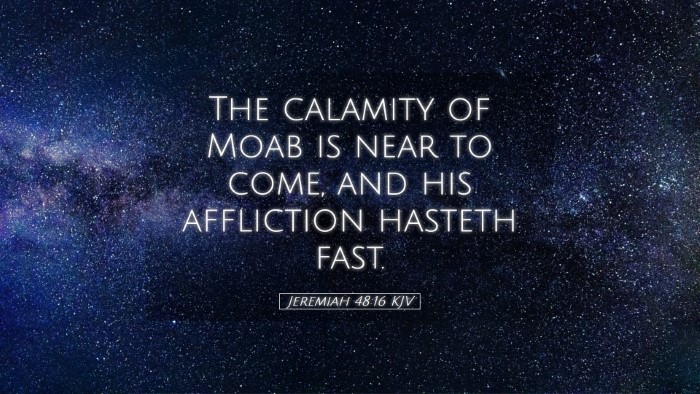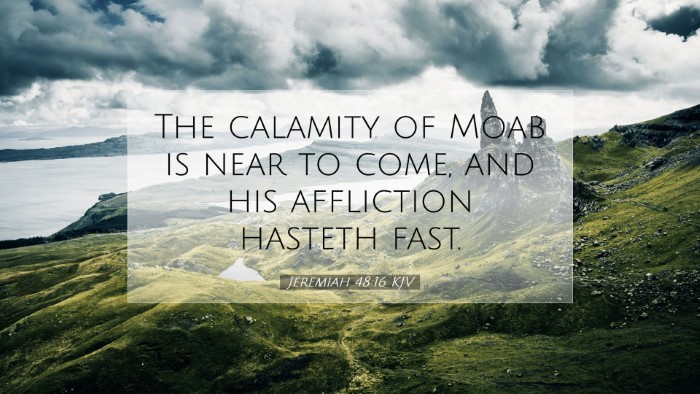Commentary on Jeremiah 48:16
Jeremiah 48:16 states: "The calamity of Moab is near to come, and his affliction hasteth fast." This verse is part of a larger prophecy concerning the nation of Moab, revealing the impending judgment that will befall it due to its pride and sinfulness.
Introduction
The book of Jeremiah is filled with warnings, prophecies, and lamentations regarding the fate of nations that opposed God's will. Moab, located east of the Jordan River, was a frequent adversary of Israel. This commentary synthesizes insights from esteemed public domain commentaries to explore the nuances of Jeremiah 48:16, elucidating the moral, historical, and theological implications of the text.
Contextual Overview
Understanding Jeremiah 48:16 requires an appreciation of its historical context. Moab was not only a neighboring nation but also one that had a complex relationship with Israel, oscillating between conflict and relative peace. The Moabites descended from Lot, Abraham's nephew, and exhibited a recurring pattern of idolatry and pride, which brought them into conflict with Yahweh's covenant people.
The Prophetic Message
The prophecy serves as a solemn declaration of judgment. Both Albert Barnes and Adam Clarke note that the swift arrival of calamity indicates the certainty and immediacy of God’s judgment on Moab. It reflects the principle that divine justice does not linger but operates in a timely manner to address the unrepentant sin.
Key Themes and Insights
-
The Certainty of Judgment:
Matthew Henry underscores that the "calamity of Moab is near," emphasizing that prophetic words cannot be taken lightly. The fulfillment of such prophecies reinforces God's sovereignty over nations and His willingness to address iniquity decisively.
-
The Nature of Affliction:
Clarke elucidates that affliction here refers to the broader consequences of sin, warning readers that neglecting spiritual integrity leads to inevitable suffering. The phrase "hasteth fast" denotes not just speed, but an uncontrollable force, highlighting that these are not merely natural disasters but divine actions against rebellious nations.
-
The Call to Repentance:
This prophetic declaration carries an implicit call to repentance - both for Moab and, by extension, surrounding nations. Henry articulates that the purpose of prophetic warnings is often to lead the audience back to God, urging them to reconsider their ways before disaster strikes.
Theological Implications
This prophetic message has profound theological implications, particularly concerning the nature of God’s justice and mercy. God’s judgment can be seen as a necessary aspect of His holiness, where injustice cannot go unpunished. However, within the judgment is the glimmer of hope for repentance and restoration. Clarke posits that the knowledge of impending judgment serves to awaken nations from spiritual complacency.
Historical Analysis
The fate of Moab is not just a historical account but serves as a typological warning for future generations. Tied to their pride, Moab’s downfall was foretold and later realized during the Babylonian conquests, aligning with Barnes’ historical commentary on the subsequent events faced by the Moabites as they fell under foreign rule and influence.
Pastoral Applications
For pastors and church leaders, Jeremiah 48:16 reminds them of the responsibility to speak truthfully about sin and judgment while extending the call to repentance. In a culture often resistant to such themes, it remains vital to convey that God’s justice is an expression of His loving nature, desiring reconciliation rather than destruction.
Concluding Thoughts
In summary, Jeremiah 48:16 serves as a poignant reminder of the realities of divine oversight in human affairs. The synthesis of insights from Henry, Barnes, and Clarke provides a richer understanding of not only Moab's judgment but also the broader moral lessons applicable to all nations and individuals who stray from the path of righteousness.
As scholars and theologians reflect on this verse, may they be motivated to delve deeper into understanding God’s character, the reality of sin, and the hope of repentance that comes through genuine faith.


